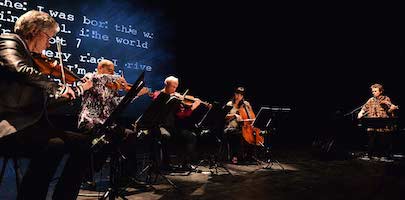Known for her electronic aplomb, Laurie Anderson’s newest collaboration with the experimental Kronos Quartet is subversive with moving documents of suffering and loss. The long-awaited pair has been in the works for “many years” says Kronos founder David Harrington. The album was released in February 2018 by Nonesuch Record’s. The fabulously iconic performative artist whose career spans 50-years including performance art, recitative, spoken word, and more. She credits her influences to the ‘70s downtown performance art scene in New York.
Landfall is a 30-track performative art-piece. Reviewing every track is somewhat impossible as the album is like a story in which all the tracks fuse together, each one like a piece to a puzzle. Landfall deserves careful listening time to discover it’s beauty and will, therefore, become captivating listening for fans of contemporary classical music, Anderson and the Kronos Quartet. The complex nature of the music juxtaposes electronics and strings with Anderson’s trademark narration.
The stimulus for the album was Laurie’s experience during the Hurricane Sandy of 2012, a truly catastrophic natural disaster, of course with the exception of the brilliant creation of Landfall.
In October 2012, Sandy hit the New Jersey coast with a record-breaking 32.5-foot wave which plummeted into New York Harbour, flooding Anderson’s Manhattan home. In the album, she relives the events of the natural disaster as well as ruminating on the idea of how we deal with loss.

Throughout Landfall, Anderson provides powerful descriptions of the destruction across New York. The album’s opening tracks unfold relatively chronologically: “CNN Predicts a Monster Storm,” “Wind Whistles Through the Dark City,” “The Water Rises” and “Our Street is a Black River”.
In New York of the ‘80s, Anderson was actively immersed in the evolution of digital technology. The digital technologies of DSP (Digital Signal Processing) and the development of microprocessors invaded recording studios and became integral to Anderson’s musical compositions. Previously, this kind of electronic processing was her primary technique for erasing vocal modes, such as in her 1982 debut album single, Big Science.
Her most successful works have revolved around vocal processing – check out her 8-minute phenomenon, O Superman to see where this exemplar began. The ‘80s hit unexpectedly rocketed to #2 in the 1981 British pop charts, undoubtedly Anderson’s breakthrough single which affirmed her place on the international musical map.
These days, Anderson seems more intrigued by the aesthetic appeal of the human voice. In Landfall, her imitative vocals first appear in “Our Street is a Black River”, where she “watched as the sparkling black river crossed the park/ Then a highway/ Then came silently up our street”. The prelude of this track, “The Water Rises”, creates an intensifying sense of doom through a metronome backbeat which conflicts with the subdue of electronically manipulated sounds. “These are stories with tempos,” asserts Anderson. “I’ve always been fascinated by the complex relationship of words and music whether in song lyrics, supertitles or voice over. The use of initiating time through repeating cells instantly resonates the novelty of O Superman.
In Landfall, Anderson blends narration and song in unusual ways. In “Wind Whistles Through the Dark City” the screeching violin-centric melody manifests as the approaching storm. In the background Anderson explores the vicinity of the voice: a mysterious male voice repeats a barely audible number sequence in Russian. This could be a “number station” on a radio transmitter which against the looped electronics creates an interesting yet eccentric textural sound.

“My recording studio was an image as well as a sound lab,” reveals Anderson. Indeed, in the premiere of Landfall, she used high-tech software that translated the sounds of Kronos into pictographs and words on a screen, along with on-stage smoke and elaborate lighting. There was also music elements from the optigan, a keyboard that interprets information stored on optical discs.
Landfall opens with a spine-tingling violin melody in “CNN Predicts a Monster Storm”, which later interweaves its way into “Built You a Mountain”. In this track, the quartet pauses for a moment of breathtaking silence before transitioning into a new, just as haunting theme. The sonic heaviness provided by voiceovers and delays of software is a dreamy marriage with the acoustic sobriety of the violins, “the dominant sound of Landfall,” says Anderson. At this point in the story Anderson had lost electricity in their house and had to relocate to a hotel; a theme which spans four tracks.
“After the storm, I went down to the basement and everything was floating,” she intones. Keyboards, books, props, projectors, and papers were among the losses, “all the things I’d carefully saved for all my life”, reduced to “nothing but junk.” Anderson described the tragic loss of her home as “beautiful” yet “catastrophic” and musically revisits on the musings of this memory in the track “Everything is floating”. Another form of loss is depicted in “Nothing Left but Their Names” where Anderson’s recorded voice electronically slows down.
A lot of Anderson’s other repertoire explores loss, such as in her 2010 album, Homeland. The album addresses the loss of freedom, states of fear and loneliness. Another more recent album is The Heart of a Dog which offers a glimpse into the heartbreak following the loss of her husband Lou Reed, her mother and her dog.
Halfway through Landfall the album takes a haunting turn. “Dawn of the World” is indeed an uneasy listen in which horror movie-like violin motifs move in and out of the foreground.
Overall, Landfall is a musical journey and Anderson’s signature story-telling narration examines an array of powerful subjects, truly magical but truly catastrophic. And, by the end, we realise in this musical polymath that Anderson empowers us with hope as she manages to radiate some joy and brilliance from such a catastrophic tragedy.
- Metronomy – Forever - 28th September 2019
- Laurie Anderson / Kronos Quartet: Landfall Album - 28th September 2019
